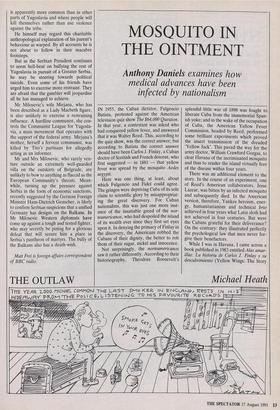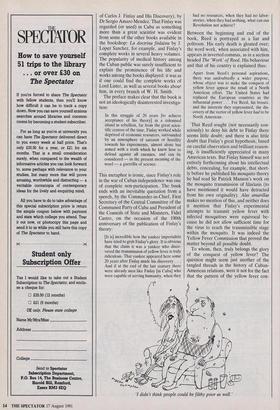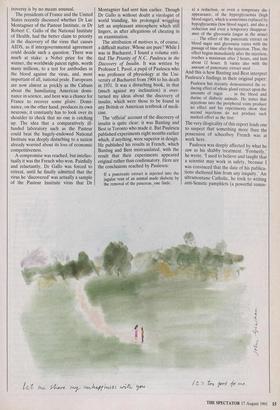MOSQUITO IN THE OINTMENT
Anthony Daniels examines how
medical advances have been infected by nationalism
IN 1955, the Cuban dictator, Fulgencio Batista, protested against the American television quiz show The $64,000 Question. In that year, a contestant was asked who had conquered yellow fever, and answered that it was Walter Reed. This, according to the quiz show, was the correct answer; but according to Batista the correct answer should have been Carlos J. Finlay, a Cuban doctor of Scottish and French descent, who first suggested — in 1881 — that yellow fever was spread by the mosquito Aedes aegypti.
Here was one thing, at least, about which Fulgencio and Fidel could agree. The gringos were depriving Cuba of its sole claim to scientific glory by misappropriat- ing the great discovery. For Cuban nationalists, this was just one more inst- ance of the insatiable greed of the nor- teamericanos, who had despoiled the island of its wealth ever since they first set eyes upon it. In denying the primacy of Finlay in the discovery, the Americans robbed the Cubans of their dignity, the better to rob them of their sugar, nickel and innocence.
Not surprisingly, the norteamericanos saw it rather differently. According to their historiography, Theodore Roosevelt's splendid little war of 1898 was fought to liberate Cuba from the immemorial Span- ish yoke; and in the wake of the occupation of Cuba, the American Yellow Fever Commission, headed by Reed, performed some brilliant experiments which proved the insect transmission of the dreaded 'Yellow Jack'. This paved the way for the army doctor, William Crawford Gorgas, to clear Havana of the incriminated mosquito and thus to render the island virtually free of the disease within four years. There was an additional element to the story. In the course of an experiment, one of Reed's American collaborators, Jesse Lazear, was bitten by an infected mosquito and subsequently died. In the American version, therefore, Yankee heroism, ener- gy, humanitarianism and technical brio achieved in four years what Latin sloth had not achieved in four centuries. But were the Cubans grateful for their deliverance? On the contrary: they illustrated perfectly the psychological law that men never for- give their benefactors.
While I was in Havana, I came across a book published in 1983 entitled Alas amar- illas: La historia de Carlos J. Finlay y su descubrimiento (Yellow Wings: The Story
of Carlos J. Finlay and His Discovery), by Dr Sergio Amaro Mendez. That Finlay was regarded (or used) in Cuba as something more than a great scientist was evident from some of the other books available in the bookshop: La doctrina finlaista by J. Lopez Sanchez, for example, and Finlay's complete works in several heavy volumes. The popularity of medical history among the Cuban public was surely insufficient to explain the prominence of his life and works among the books displayed: it was as if one could find the complete works of Lord Lister, as well as several books about him, in every branch of W. H. Smith.
The preface makes clear that the book is not an ideologically disinterested investiga- tion:
In this struggle of 20 years f to achieve acceptance of his theory] in a colonised island in rebellion, far from the great scien- tific centres of the time, Finlay worked while deprived of economic resources, surrounded by an atmosphere of sarcasm or hostility towards his experiments, almost alone but armed with a truth which he knew how to defend against all enemies, and can lie considered — in the present meaning of the word — a guerrilla of science.
This metaphor is ironic, since Finlay's role in the war of Cuban independence was one of complete non-participation. The book ends with an inevitable quotation from a speech, by the Commander-in-Chief, First Secretary of the Central Committee of the Communist Party of Cuba and President of the Councils of State and Ministers, Fidel Castro, on the occasion of the 100th anniversary of the publication of Finlay's theory:
[It is] incredible how the yankee imperialists have tried to grab Finlay's glory. It is obvious that the claim it was a yankee who disco- vered the transmission of yellow fever is truly ridiculous. That yankee appeared here some 20 years after Finlay made his discovery . . . And if at the end of the last century there were already men like Finlay [in Cuba] who were capable of serving humanity, when they
had no resources, when they had no labor- atories, when they had nothing, what can our Revolution not achieve?
Between the beginning and end of the book, Reed is portrayed as a liar and poltroon. His early death is gloated over; the word work, when associated with him, appears in inverted commas, as in a section headed The 'Work' of Reed. His behaviour and that of his country is explained thus:
Apart from Reed's personal aspirations, there was undoubtedly a wider purpose, whose object was to make the conquest of yellow fever appear the result of a North American effort. The United States had replaced the European countries as the influential power . . . For Reed, his bosses, and the interests they represented, the dis- covery of the vector of yellow fever had to be North American.
That Reed sought (not necessarily con- sciously) to deny his debt to Finlay there seems little doubt; and there is also little doubt that Finlay's great hypothesis, based on careful observation and brilliant reason- ing, is insufficiently appreciated in many American texts. But Finlay himself was not entirely forthcoming about his intellectual debts, concealing, for example, that short- ly before he published his mosquito theory he had read Sir Patrick Manson's work on the mosquito transmission of filariasis (to have mentioned it would have detracted from his own originality). Alas amarillas makes no mention of this, and neither does it mention that Finlay's experimental attempts to transmit yellow fever with infected mosquitoes were equivocal be- cause he did not allow sufficient time for the virus to reach the transmissible stage within the mosquito. It was indeed the Yellow Fever Commission that proved the matter beyond all possible doubt.
To whom, then, truly belongs the glory of the conquest of yellow fever? The question might seem just another of the tangled threads in the history of Cuban- American relations, were it not for the fact that the pattern of the yellow fever con- 'I didn't think people could be filthy poor as well.' troversy is by no means unusual.
The presidents of France and the United States recently discussed whether Dr Luc Montagnier of the Pasteur Institute, or Dr Robert C. Gallo of the National Institute of Health, had the better claim to priority in the discovery of the virus that causes AIDS, as if intergovernmental agreement could decide such a question. There was much at stake: a Nobel prize for the winner, the worldwide patent rights, worth many millions, to a test for antibodies in the blood against the virus, and, most important of all, national pride. Europeans are now almost as prickly as the Cubans about the humiliating American domi- nance in science, and here was a chance for France to recover some gloire. Domi- nance, on the other hand, produces its own neurosis; it constantly has to look over its shoulder to check that no one is catching up. The idea that a comparatively ill- funded laboratory such as the Pasteur could beat the hugely-endowed National Institute was deeply disturbing to a nation already worried about its loss of economic competitiveness.
A compromise was reached, but intellec- tually it was the French who won. Painfully and reluctantly, Dr Gallo was forced to retreat, until he finally admitted that the virus he 'discovered' was actually a sample of the Pasteur Institute virus that Dr Montagnier had sent him earlier. Though Dr Gallo is without doubt a virologist of world tanding, his prolonged wriggling left an unpleasant atmosphere which still lingers, as after allegations of cheating in an examination.
The attribution of motives is, of course, a difficult matter. Whose are pure? While I was in Bucharest, I found a volume enti- tled The Priority of N. C. Paulescu in the Discovery of Insulin. It was written by Professor I. Pavel, a pupil of Paulescu who was professor of physiology at the Uni- versity of Bucharest from 1904 to his death in 1931. It was a disturbing book, in that (much against my inclination) it over- turned my ideas about the discovery of insulin, which were those to be found in any British or American textbook of medi- cine.
The 'official' account of the discovery of insulin is quite clear: it was Banting and Best in Toronto who made it. But Paulescu published experiments eight months earlier which, if anything, were superior in design. He published his results in French, which Banting and Best mistranslated, with the result that their experiments appeared original rather than confirmatory. Here are the conclusions reached by Paulescu:
If a pancreatic extract is injected into the jugular vein of an animal made diabetic by the removal of the pancreas, one finds: a) a reduction, or even a temporary dis- appearance, of the hyperglycaemia (high blood sugar), which is sometimes replaced by hypoglycaemia (low blood sugar), and also a reduction and even a temporary disappear- ance of the glycosuria (sugar in the urine) . . The effect of the pancreatic extract on blood sugar and glycosuria varies with the passage of time after the injection. Thus, the effect begins immediately after the injection, reaches a maximum after 2 hours, and lasts about 12 hours. It varies also with the amount of pancreatic extract used . . .
And this is how Banting and Best interpret Paulescu's findings in their original paper: Paulescu has recently demonstrated the re- ducing effect of whole gland extract upon the amounts of sugar . • in the blood and durine of diabetic animals. He states that injections into the peripheral veins produce no effect and his experiments show that second injections do not produce such marked effect as the first.
The very illogicality of this report leads one to suspect that something more than the possession of schoolboy French was at work here.
Paulescu was deeply affected by what he saw as his shabby treatment. 'Formerly,' he wrote, 'I used to believe and taught that. a scientist may work in safety, because I was convinced that the date of his publica- tions sheltered him from any iniquity.' An ultramontane Catholic, he took to writing anti-Semitic pamphlets (a powerful remin- der that brilliant intelligence is no protec- tion against stupidity and other faults). He died embittered.
Great discovery is not infrequently fol- lowed by disillusionment and squabbles, often with nationalistic overtones. Ronald Ross, who spent several heroically pain- staking years in India under almost intoler- able conditions to prove the mosquito tramsmission of malaria, wrote the follow- ing lines in immediate response to his historic victory: This day relenting God Hath placed within my hand A wonderous thing; and God Be praised. At his command.
Seeking his secret deeds With tears and toiling breath, I find thy cunning seeds, 0 million-murdering Death.
I knew this little thing A myriad men may save. 0 Death, where is thy sting? Thy victory, 0 Grave?
It cannot be said, therefore, that Ross failed to appreciate the magnitude of what he had done: he proved that avian malaria was transmitted by anopheline mosquitoes. The lesser intellectual task of proving that human malaria followed the same pattern was left to an Italian, Giovanni Battista Grassi; after the period of euphoric con- gratulations, Ross and Grassi settled down to careers of mutual recrimination that ruined the last years of both of their lives.
What does all this prove? Since the writing of the history of medicine has been taken over by sociologists, such unsavoury facts have been used not only to attack the idea of genius (an ideological commitment to equality lurking not very far in the background), but more radically still to impugn the rationality of science itself by demonstrating the impure motives of its practitioners. But does the fact that Ross was strangely driven by inner demons, or that his views of Indians were sometimes unprintable, prove that malaria is not in fact transmitted by mosquitoes? The rationality of science lies beyond the reach of sociologists or historians, and does not depend on the psychology of scientists. As for nationalism in science, is it destructive or creative? Alas for the Sellars and Yeatmans of the world, for whom any phenomenon must be either a Good Thing or a Bad Thing, the answer is surely equivocal. In 1896, to encourage Ross, his mentor Manson wrote: 'I have no doubt that by next summer the French and Italians will be working on [the mosquito theory]. So for goodness sake hurry up and save the laurels for old England.' The desire to serve one's country in this way is surely noble, but whether it can be easily divorced from the disparagement of other countries' efforts is another question. Nationalism can liberate and enslave at the same time, in science as in politics.





















































 Previous page
Previous page